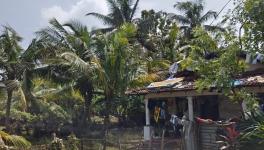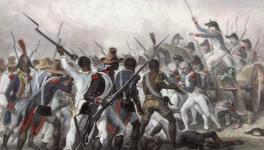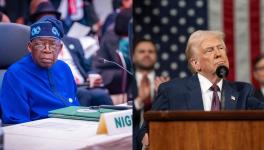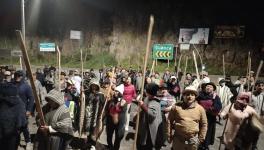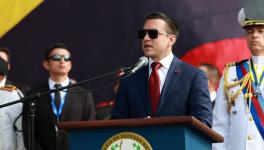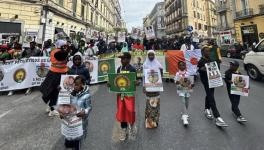Ivory Coast: Thousands Protest Slide Into Dictatorship
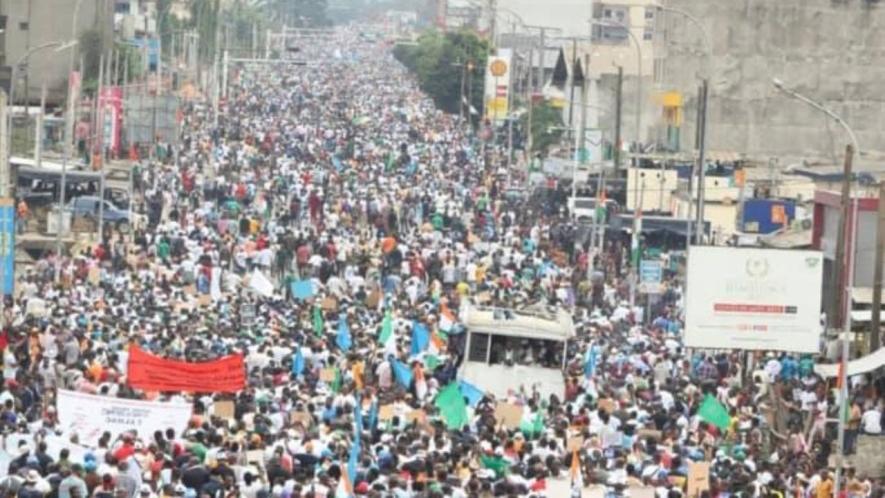
Mass protest in the Ivory Coast. Photo: PCRCI
France is “closely watching over the upcoming elections in October in its former colony, to ensure its protégé, President Alassane Ouattara, does not lose”, said Achy Ekissi, General Secretary of the Revolutionary Communist Party of Ivory Coast (PCRCI).
Taking power in 2011 with the help of French military intervention, 83-year-old Ouattara is attempting to grab office for a fourth term by barring both main contestants from running for the upcoming election in October.
While “half-heartedly asking Ouattara to step down”, France is “in reality, supporting his dictatorial drift because they have not yet found another pawn to replace him,” he told Peoples Dispatch.
Protesting against a fourth term for Ouattara, tens of thousands took to the streets in the capital, Abidjan, on Saturday, August 9, demanding that his opponents, Laurent Gbagbo and Tidjane Thiam, be allowed to contest.
Gbagbo, the former president of the country, with socialist and pan-Africanist inclinations, was bombed out of office by the French military in 2011 to bring Ouattara to power.
He is arguably the most “popular” of Ouattara’s rivals. However, his popularity, mainly in the working class, does not translate into votes because large sections are not registered on the electoral rolls, explained Ekissi.
In terms of voter consolidation, Thiam, former CEO of the Swiss bank Credit Suisse, is a greater threat to Ouattara. Both “share the same social base of the upper strata of civil servants, businessmen, wealthy and middle peasants, traders, artisans, and transport operators,” with “strong ties with Western imperialist powers,” Ekissi added. Thiam took over the leadership of the Democratic Party of Ivory Coast – African Democratic Rally (PDCI-RDA) in 2023.
A history of shifting alliances
He is the political successor to Henri Konan Bédié. A former ally of Ouattara, Bédié became his main opponent after 2018, after Ouattara’s refusal to honor a power-sharing agreement by ceding the presidency to PDCI in 2020, in exchange for its support in the 2010 and 2015 elections.
The PDCI-RDA is Ivory Coast’s oldest political party, which ruled as a one-party, France-backed dictatorship under President Felix Houphouet-Boigny from the time of formal independence in 1960 until he died in 1993. During the last three years of this dictatorship, Ouattara had served Boigny as the Prime Minister.
However, Ouattara was marginalized in the succession race within the ruling party after President Boigny’s death. Henri Bédié, the then president of the National Assembly, took the reins. Ahead of the first multi-party election in 1995, Bédié amended the constitution to mandate that both parents of candidates must be Ivorians and the candidate must have stayed in the country for more than five years.
By thus disqualifying both Gbagbo, who had spent decades underground resisting Boigny’s dictatorship, and his former PM, Ouattara, Bédié won the election with 96% votes.
Ouattara went on to serve the IMF as its Deputy Managing Director from 1994 to 1999. Late that year, army chief Robert Guéï took power in a coup, after which deposed Bédié fled to France. Returning to Ivory Coast, Ouattara took reins of the Rally of the Republicans (RDR), a splinter group composed of his supporters who had broken away from the PDCI.
However, the law prohibiting him from contesting was still in place, disqualifying him from the 2000 election for the same reasons as in 1995. Gbagbo defeated Guéï in the election. Although initially reluctant to cede power, Guéï was forced to flee the country in the face of mass pro-democracy protests.
France fueled the civil war against Gbagbo’s presidency
Although President Gbagbo was at the time “hesitant in directly combating French interests”, France would not allow a socialist to lead “its most important French neo-colony in West Africa”, especially after the Socialist Party-led coalition that was ruling France lost power in 2002, Ekissi explained.
Taking advantage of the discontent that had been brewing in the Muslim north, which had for decades felt marginalized by the Christian south, the new French government helped Ouattara organize an armed rebellion in 2002.
The French troops moved in, positioning themselves along the center, dividing the country into north and south, ostensibly to keep the two sides from fighting. In reality, however, it was helping Ouattara’s rebels from the north while cracking down on the civilian protests against French deployment in the south by Gbagbo’s supporters.
Amid the civil war, the 2005 election was postponed. That year, PDCI’s Bédié, RDR’s Ouattara, Guéï’s party, the Union for Democracy and Peace in (UDPCI), then led by Albert Toikeusse, and another smaller party, met in Paris. Claiming to be political descendants of Boigny, they formed the coalition, Rassemblement des Houphouëtistes pour la Démocratie et la Paix (RHDP).
This coalition, including Bédié, backed the candidacy of Ouattara in the 2010 election, putting up a united front against Gbagbo. The election was “manipulated by France” in Ouattara’s favor, Ekissi maintains.
The election commission’s president fled from his office to Ouattara’s base at a hotel in Abidjan guarded by French troops, before announcing, after the deadline, that Ouattara had won with 54.1% of the vote. Nevertheless, the Constitutional Council reversed his verdict in favor of Gbagbo, citing irregularities in the results submitted by the commission.
Within months after Gbagbo took the oath, French troops killed thousands of soldiers and protesting civilians defending him, before bombing the Presidential Palace in April 2011, helping Ouattara’s forces capture Gbagbo, who was then tried in the International Criminal Court (ICC).
Almost eight years after his arrest, he was acquitted in 2019. Prosecutors’ appeal against his acquittal did not succeed. The ICC upheld his acquittal in 2021, following which he returned to Ivory Coast.
In the meantime, Ouattara had won the 2015 election without any major opponent. Bédié did not contest. His PDCI supported Ouattara, on the basis of an understanding that in 2020, after Ouattara finished serving two terms, his RDR would support a PDCI candidate.
However, Ouattara did not intend to keep this promise. By 2018, when he pushed the electoral alliance RHDP into a unified political party, the PDCI refused to dissolve, broke the coalition, and joined the opposition.
In the 2020 election, when Gbagbo was still under trial, Bédié was the main opposition leader. However, he boycotted the election, calling Ouattara’s candidacy illegal because constitutional amendments in 2016 had limited the presidential terms to two, the first ending in 2015 and the second in 2020.
Maintaining that the two-term limit started afresh after the amendment – meaning 2020 would be the first of his limited two terms – Ouattara contested and won, with no major opponent challenging him.
PDCI’s shift to opposition
State repression intensified. Earlier reserved for the sovereigntist and anti-imperialist opposition parties, it was now used to target the PDCI also, “even though it belongs to the same camp” as the ruling party in terms of class composition and relation to neocolonialism, Akissi explained.
France goes along with this repression because it has “not yet found another pawn of at least equivalent stature to Ouattara”, he adds. It regards Ouattara as the solid “pillar” of its colonialism in West Africa, which it is not prepared to risk losing.
Its puppet regimes have already been ousted in Mali, Burkina Faso, and Niger since 2020. “Senegal is uncertain,” under the new government formed after the election in 2024. “Benin is wavering under a strong sovereigntist opposition. Guinea is unstable. Ghana and Nigeria are not firmly in their camp. Togo and Guinea-Bissau are economically weak,” he added. Under the circumstances, “a setback” to Ouattara’s power “would be a major loss” for its neocolonial power, he reasons.
“These contradictions have led the PDCI to move closer to the sovereigntist opposition, without adopting the sovereigntist ideological line,” Akissi explained. Against this backdrop, Tidjane Thiam, who had remained in exile, fleeing the country after the 1999 coup, returned to Ivory Coast in 2022. After Bédié’s death in mid-2023, he took charge of PDCI.
Thiam’s PDCI and Gbagbo’s African Peoples’ Party – Ivory Coast (PPA-CI) had together called for the protest against Ouattara on August 9, in which the Communist Party also took part, alongside unions and other civil society groups that are not a part of either’s coalition.
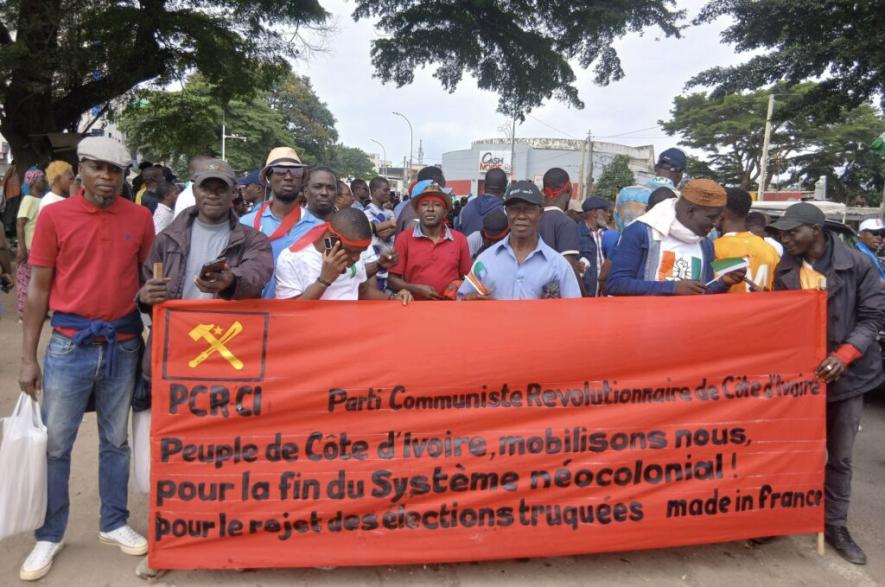
Members of the Revolutionary Communist Party of Ivory Coast (PCRCI). Photo: PCRCI
“Contradictions between Thiam and Gbagbo have been set aside for the moment. But as soon as the ban against their participation in the 2025 election is lifted, this alliance will come to an end,” Akissi said.
“It should be noted that this opposition is very fragmented. The protest on August 9 was the first united action” against “Ouattara’s drift toward dictatorship. But on the question of governing, there is not yet any agreement between the political coalition led by Thiam and the sovereigntists.”
Ouattara’s contested legacy
Reporting on this protest, several Western media outlets like Bloomberg made it a point to mention that Ouattara had delivered an average of 6% growth during his decade-and-a-half rule so far.
“But the wealth produced by the workers did not benefit them,” maintains Atse Désiré, deputy secretary general of the General Confederation of Workers of Ivory Coast (CGT-CI), which also took part in the protests.
“Apart from a few meager gains concerning salary supplements, the workers have gained nothing since Ouattara took power, despite all the struggles – most of which were repressed with dismissals, arrests, salary suspensions, and deductions,” he told Peoples Dispatch.
Even the “meager gains” are being fast eaten away by the cost of living soaring against stagnant wages, Désiré adds.
Although there has been considerable infrastructural improvement in terms of roads, electricity, and water supply, education, and healthcare, these resulted from the foreign investments that came for post-civil war reconstruction “after imperialists destroyed Ivory Coast in 2011 and installed Ouattara”, Akissi said.
The cost was enormous in terms of debt accumulation, “rising from 2,000 billion FCFA to over 30,000 billion,” he added. “It should be noted that the investment in infrastructure amounts to only 60% of the loans. The rest was embezzled by those in power.”
It is in the backdrop of the resulting discontent growing among the popular classes that the left and the trade unions participating in the protest on August 9 also called for wage hikes and remunerative prices for farmers, and tax relief for small enterprises and the informal sector.
Courtesy: Peoples Dispatch
Get the latest reports & analysis with people's perspective on Protests, movements & deep analytical videos, discussions of the current affairs in your Telegram app. Subscribe to NewsClick's Telegram channel & get Real-Time updates on stories, as they get published on our website.











